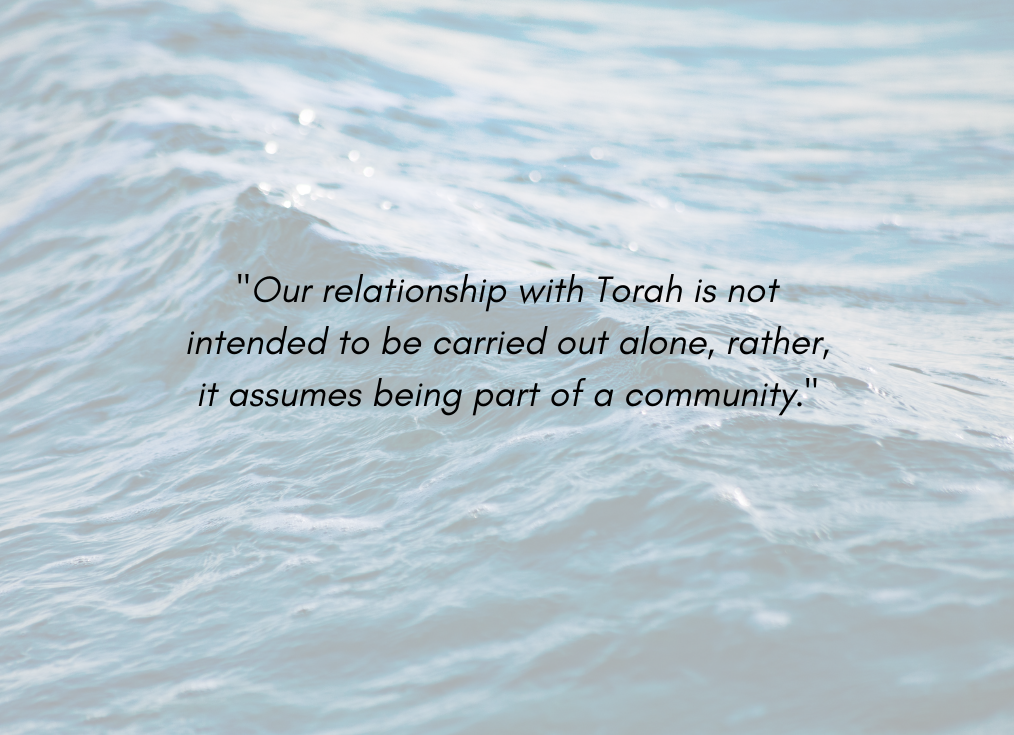Our Connection to Water

April 14, 2023 / 23 Nissan 5783
The relationship between Jews and water has existed since the story of creation. In the opening verses of Genesis, we are told that “When Gd began to create heaven and earth, the earth was unformed and void, with darkness over the surface of the deep, and the spirit of Gd sweeping over the water.” (Genesis 1:1-2)
Later in Genesis we read the infamous story of Noah and the flood, and chapters later of our matriarchs and their relationships with the community wells. Additionally, we have Abraham leaving Haran to go to Egypt because of the drought and famine, and two generations later Jacob’s family also moving to Egypt for similar reasons.
Water, or lack thereof, is a recurring story throughout our history, In fact, it is not only the physical relationship with water, which we are taught about, but also the spiritual and theological. Our great sages described themselves as being “Thirsty for Torah.” In Isaiah 55:1 we read the prophet’s words, “All who are thirsty come for water,” which Rashi translates as those seeking Torah. When we relive the story of the Exodus, as we have just done in our celebrations of the Passover holiday, each of us needed to pass through the Sea of Reeds, as we relive this experience as the final transition from slavery to freedom.
…
There is the wonderful Midrash (Rabbinic story) of Nachshon, son of Amminadav, who is credited as being the person responsible for the actual splitting of the Sea. Although Moses was tasked with raising his wooden staff to initiate the winds, it wasn’t until Nachshon began walking into the water, until he began choking on the water as it reached his mouth and nostrils, that Gd finally separated the Sea. The following Mi Chamocha prayer (Exodus 15:11) is what is believed to have been said by Nachshon as he was swallowing the waters, committed to continuing forth in belief that the Sea would eventually split.
מִֽי־כָמֹ֤כָה בָּֽאֵלִם֙ ה’
מִ֥י כָּמֹ֖כָה נֶאְדָּ֣ר בַּקֹּ֑דֶשׁ
נוֹרָ֥א תְהִלֹּ֖ת עֹ֥שֵׂה פֶֽלֶא׃
Who is like You, O Gd, among everything which is worshipped;
Who is like You, majestic in holiness,
Awesome in splendor, working wonders!
And so, when we read in this week’s Torah portion, Shemini, that, “[We] may eat from everything that is in the water, everything that has fins and scales” (Leviticus 11:9), we cannot ignore the literal as well as the metaphorical message being presented.
Ensuring the combination of these two elements is as important to our interactions with Torah as they are essential to identifying kosher fish. And then there are the fins, used for balance, stability, and steering. Ensuring the combination of these two elements as essential components to how we are expected to approach Torah.
One must be willing to approach the Torah with a shielded, guarded, and cautious attitude. Diving into the journey with no plan can get us lost and overwhelmed. Similarly, we need to be balanced and conscious of the influences along the way. We should not be easily swayed one way or another in search of our personal path, sometimes we need to move with the flow downstream and yet other times travel upstream against the natural current.
But how we approach the Torah is only the start of the relationship. Adin Steinsaltz z”l expounded on this idea when he explained that, “… the Torah anticipates that those who walk in its path will be members of a community, whose support and encouragement will help facilitate their spiritual growth and development. Moreover, an essential aspect of a Torah scholar is the role that he plays in improving the world around him.”
Our relationship with Torah is not intended to be carried out alone, rather, it assumes being part of a community. Therefore, as we move away from the Passover story, of our time as slaves in Egypt, may we continue our journey into freedom and participation in an active and vibrant Jewish lifestyle. It is in this light that I invite you to circle your calendars and join the community to celebrate, recognize, and honor these upcoming STRONGER TOGETHER community events:
-
- 4/17 – Yom HaShoah Holocaust Memorial Day Community-Wide Observance, 6:00pm at Congregation Agudas Achim
- 4/24 – Yom Hazikaron Israel Memorial Day Community-Wide Service, 7:00pm at the Jewish Community Campus
- 4/30 – Yom Ha’Atzmaut Israel Independence Day YALLA Celebration, 1:00pm in partnership with the Barshop Jewish Community Center
We look forward to seeing you there because we are…
Shabbat shalom,

